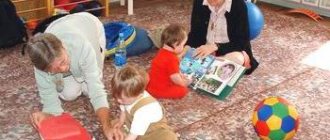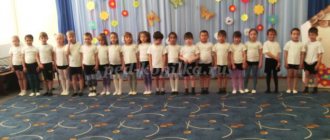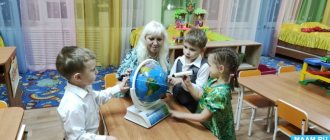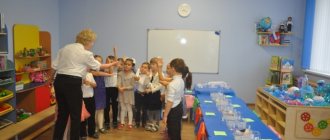Preparatory group. Senior preschool age. Children 6-7 years old
Self-education program “Development of speech of senior preschool age children through play activities” Educator: Kolpakova E.I. 2022 – 2022 academic year d. Goal: to study the ways, methods and techniques of activating the speech of preschool children, to unite the efforts of teachers and...
Self-education of the teacher of the preparatory group “Theatrical activities as a means of developing the speech of preschoolers” Self-education of the teacher of the preparatory group on the topic “Theatrical activities as a means of developing the speech of preschoolers”
Children's whole life is filled with play. Every child wants to play their role. Teach a child to play, take on a role and act, at the same time...
Self-education plan “Connected speech in the preparatory group”
Academic year: 2017-2018
Relevance.
By the beginning of school, a child must master the entire system of his native language, that is, by the age of seven he must have a sufficient level of development of vocabulary, grammatical structure of speech, phonetic-phonemic side of language activity, coherent dialogical and monologue speech.
Full command of the native language in preschool age is a necessary condition for solving the problems of mental, aesthetic and moral education of children in the most sensitive period of development.
At preschool age, the child masters, first of all, dialogical speech, which has its own specific characteristics, manifested in the use of linguistic means, which is built according to the laws of the literary language. Only special speech education allows a child to master coherent monologue speech, which is an expanded statement consisting of several sentences, divided according to the functional-semantic type into description, narration, and reasoning.
The development of coherent speech is realized through various organizational forms of work: classes (individual, subgroup, group), games (educational, generalizing, cognitive, developmental, productive, communicative, creative, subject, plot, role-playing, verbal and active, etc.) integrated classes.
The formation of coherent speech, the development of the ability to construct a statement meaningfully and logically is one of the main tasks of a child’s speech development.
Target:
increasing your theoretical level, professional skills and competence.
Tasks:
development of free communication with adults;
– improve the dialogical form of speech.
-develop a monologue form of speech;
– learn to retell short tales and stories coherently, consistently and expressively;
– teach (according to a plan and model) to talk about the subject, the content of the plot picture; compose a story based on pictures with sequentially developing events;
– develop the ability to compose your own stories from personal experience.
Self-education plan for the 2017-2018 academic year.
| Month | Subject | The content of the work | Practical solution |
| September October | "Development of coherent speech in the preparatory group" | Selection and study of literature on the topic; didactic games and exercises; plot paintings. | Information stand for parents “Child’s speech as a means of communication” |
| November | Speech development using didactic games. | Clarifying knowledge about activating and enriching children's vocabulary through didactic games. | Consultation for parents on the topic: "Didactic game as a means of connected speech." Card index of didactic games for studying with children Sharing experience with colleagues. Showing a lesson for parents. (11/17/2017) GCD on the topic “Family” |
| December | The influence of Russian folk tales on the development of coherent speech in preschool children | Teaching children to listen carefully to the teacher; see and highlight the positive and negative features of fairy tales and the heroes of these fairy tales; learn to answer the teacher’s questions about the content of the fairy tale. Help children imagine their own position in choosing the method of implementing actions, the image of a literary character; encourage the ability to expressively convey emotional states in facial expressions and movements; develop the ability to compose verbal descriptions based on the perception of pantomimic sketches; activate phraseological units in speech. | Consultation for preschool teachers “Fairytale therapy” in speech development classes.” Creation of a homemade book by children and a teacher based on Russian folk tales. |
| January | Games and exercises for the development of speech in children of senior preschool age. | Improve speech hearing, consolidate the skills of clear, correct, expressive speech. Differentiation of sounds, words, sentences. Practice tempo, voice strength, diction. | Offer parents a card index of games for the development of connected speech: “Find a place for the picture” "Good bad" “Where is the beginning of the story?” |
| February | Work on compiling stories based on plot paintings. | Teach children to look at a picture and highlight its main characteristics; teach children to do research when looking at a picture; form analysis, synthesis; teach children to compose a coherent story based on the picture based on the teacher’s example. Replenish and activate children's vocabulary. | Conversations with parents about the important role children’s stories from personal experience play in the development of coherent speech, and how important it is to listen patiently and carefully to the child when he shares his impressions with you. |
| March | Development of coherent speech through theatrical activities. | Studying methodological literature about theatrical activities in kindergarten, developing children’s creative independence, developing expressiveness in speech; develop the creative abilities of preschool children. | Showing a fairy tale for children of the younger group. "Swan geese " |
| April | Joint creativity of children and parents | Development of creative independence, aesthetic taste, image transmission; Development of emotional speech. Unlocking children's creative abilities. | Family competition “Make a riddle - draw a solution.” |
| May | Preparing for summer health work. | Teach children to compose a fairy tale using a model - diagram; tell each other your fairy tales consistently and coherently; learn to come up with a title for a fairy tale; work on the dictionary - learn to select attributes of objects (adjectives to nouns); cultivate interest in fairy tales and their writing. | Studying methodological and fiction literature, as well as Internet resources on the topics: “Summer”, “Russian folk tales” |
List of used literature:
1. Bazik I. Ya. Development of the ability for visual spatial modeling when familiarizing children of senior preschool age since 1986.
2. Vachkov I.V. Fairy tale therapy: Development of self-awareness through a psychological fairy tale. M. 2001.
3. Lapteva G.V. Games for the development of emotions and creativity. Theater classes for children aged 5 – 9 years. – St. Petersburg. speech; M. Sfera, 2011.
4. Lebedeva L.V. Kozina I.V. Kulakova T.V. et al. Lesson notes on teaching children retelling using support diagrams. Senior group. Educational and methodological manual. – M. Center for Teacher Education. 2009.
5. Shorokhova O. A. Playing a fairy tale. Fairytale therapy and classes for the development of coherent speech in preschoolers. – M. Sphere shopping center. 2007.
6. Ushakova O. S. Program for the development of speech for preschool children in kindergarten. M. 1994.
7. Ushakova O. S. Development of speech and creativity of preschool children. Games, exercises, lesson notes. – M. TC Sfera, 2007.
8. Ushakova O. S. Gavrish N. V. Introducing preschoolers to fiction: Lesson notes. M, 1998.
What is teacher self-education
A constant, focused and organized process of improving and practical application of the theoretical aspects of modern methods of working with children is called self-education. Of course, a general interest in pedagogical innovations is an important element of self-education, but much more significant and relevant are the teacher’s searches for answers to questions that arise from time to time regarding working with specific children. It is this factor, according to the Federal State Educational Standard (FSES), that turns out to be fundamental when choosing a topic for self-education.
This is interesting. Developing a problem for self-education is an obligatory element of the pedagogical activity of an educator. And not only educators, but also specialized specialists working with children: speech therapist, choreographer, physical education instructor, music teacher, as well as senior educator and methodologist. In addition, the results and process of self-study are an integral part of the documentation necessary for the participation of a teacher in competitions of pedagogical excellence.
Searching for something new and interesting in a methodology is an essential element of a teacher’s professional growth.
Goals and objectives of self-education work
The mission of professional self-improvement of a teacher is universal, regardless of the age of the children with whom he works. Only specific aspects of the target components will differ:
- mastering the experience of colleagues and modern pedagogical technologies (in the context of the preparatory group, special attention should be paid, for example, to project methods, the form of work on which prepares future schoolchildren for the types of activities practiced at this level of education),
- systematization of the considered theoretical and practical experience in order to optimize it for the conditions of work with specific children (for example, when considering the experience of combining techniques for interacting with hyperactive children, a teacher who has only one such child in the group does not use the entire methodological system, but takes 1–2 element, for example, gives the child the position of leader in outdoor games),
- providing conditions for the harmonious mental, physical, emotional and mental development of each child.
Systematic work on solving such self-education problems as:
- monitoring of literature with innovative approaches to methodology and periodic return to past developments,
- moderate but systematic introduction of elements of various pedagogical technological innovations into personal practice (you should not introduce all the techniques you like into working with a group at once, even if they fit into the theme; innovations should be a “dessert” and not a “main course”, otherwise children will the state of affairs will quickly get boring),
- generalization and dissemination of one’s own pedagogical experience among colleagues, based on a creative understanding of the practice of psychologists, teachers and methodologists (in other words, there is no need to rewrite even successful lesson notes from publication to publication, but it is necessary to share one’s own pedagogical developments),
- a clear example of constant personal improvement (new techniques in work attract not only children, but also their parents, and given the “contagiousness” of such innovations, mothers and fathers also begin to be interested in different forms of interaction with children).
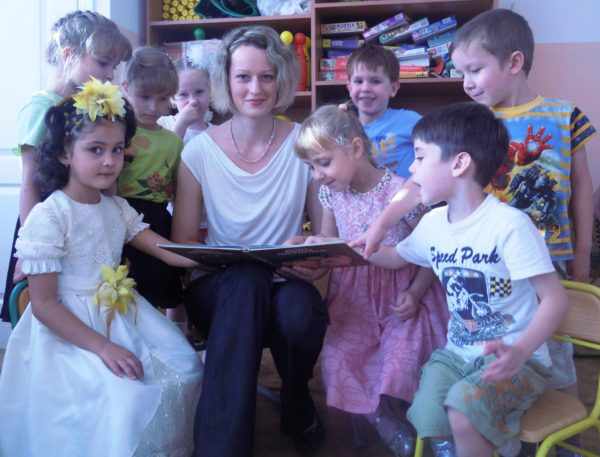
Self-education makes it possible to find the most effective ways to interact with children
Principles of organizing self-study work
Self-study is effective only if the work is based on the following principles:
- continuity of coverage of the chosen topic (depending on the topic, the work can cover one academic year, or maybe 2-4, that is, it is developed throughout the entire period of work with children - from the second junior group to preparatory),
- continuity of topics (the next topic should somehow be in contact with the previous one, while meeting the goals and objectives of the educational process in the preschool educational institution),
- accessibility to the practical implementation of the theory (when, for example, a teacher considers a topic related to computer technology in the classroom, you should not immediately introduce elements of children’s independent activities on the interactive board, especially if the children are in the computer science classroom for the first time),
- the relationship between professional and universal culture (this requirement concerns mainly the evaluative characteristics of religious and family values - this is a deeply intimate area of human relationships).
Forms of self-education activities
Activities related to professional and personal growth are carried out in two forms:
- individual, that is, the teacher attends classes taught by colleagues, takes part in pedagogical and methodological councils and develops a particular topic independently,
- group, when several teachers summarize the experience of their colleagues and, on this basis, create, for example, an original educational program.
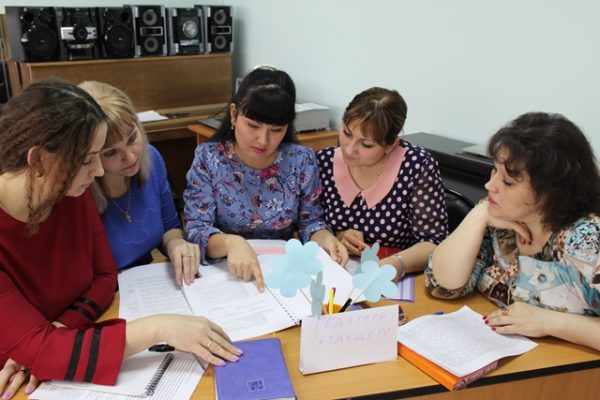
Collective work involves sharing experience in studying the topic and drawing up narrowly focused educational programs on this basis
